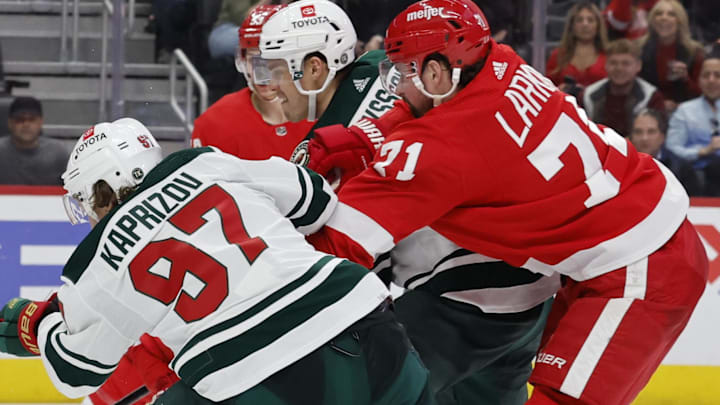The Minnesota Wild signed Kirill Kaprizov to a massive eight-year deal with a $17 million AAV, and that's sending shockwaves throughout the NHL. With Kaprizov in St. Paul for the next eight seasons, barring a trade or a buyout, organizations like the Detroit Red Wings will heave a sigh of relief while some in the NHL panic.
Think about some big names eligible for new contracts, like Connor McDavid and Jack Eichel, then look at the AAVs for star players Lucas Raymond, Dylan Larkin, and Moritz Seider, arguably the Wings' Big Three.
Seider is signed through the 2030-31 season with an AAV of $8.55 million. Detroit also has Larkin locked in until 2031, with an $8.7 million contract, while Raymond is inked through 2032 at an $8.075 million AAV. Do the math, and you get $25.325 million, just over $8 million north for three players as opposed to the single guy in Kaprizov.
The Detroit Red Wings have spending money
While Kaprizov is a rare talent, someone you can peg in as the elite of the elite, it's going to be a challenge for Minnesota to add more top-end talent should anyone they're looking to add call for higher salaries or longer-term deals, even with a rising salary cap. Instead, they'll rely on players sliding into supporting roles.
Look at organizations like the Edmonton Oilers and Vegas Golden Knights, two championship-caliber teams who are in cap trouble with their star players slated to hit free agency in 2026 if they don't resolve those cap issues.
The Red Wings aren't anywhere near cap trouble, with nearly $44.5 million in projected cap space that they can use for players like Marco Kasper and Elmer Soderblom when they become eligible for extensions in the summer of 2026, or even Simon Edvinsson at some point this season.
Those are solid names who will put up decent numbers. Kasper and Edvinsson already have, while Soderblom could be on the brink. None of the above will cost the Red Wings anywhere near what the Wild paid for Kaprizov, while Seider, Larkin, and Raymond could have cost more if Yzerman didn't extend them when he did.
Now, think of teams like the Tampa Bay Lightning and Florida Panthers, the Eastern Conference's two most dominant teams this decade. Florida doesn't have a single player with an AAV higher than $10 million, and they won the last two championships. Tampa doesn't have anyone with an AAV over $9.5 million, and both teams have most, if not all, of their core players on long-term deals.
The Yzerplan's sneaky good logic
Say what you will about the Yzerplan and how it hasn't produced a playoff team since Steve Yzerman took over as the general manager. But right now, the Yzerplan, though slow and painful, looks like it's on the trajectory closer to what we've seen in Tampa and in Sunrise, while teams with surefire stars will be making compromises, and that includes the Wild.
Yzerman signed the star players to his core early, and while they wouldn't have cost as much as Kaprizov, they still would have taken a larger chunk out of the cap. That's some sensational logic on Steve Yzerman's part, and it will set the stage for a few more cost-effective extensions within the next two seasons before Edvinsson and Kasper, especially, hit their primes.
